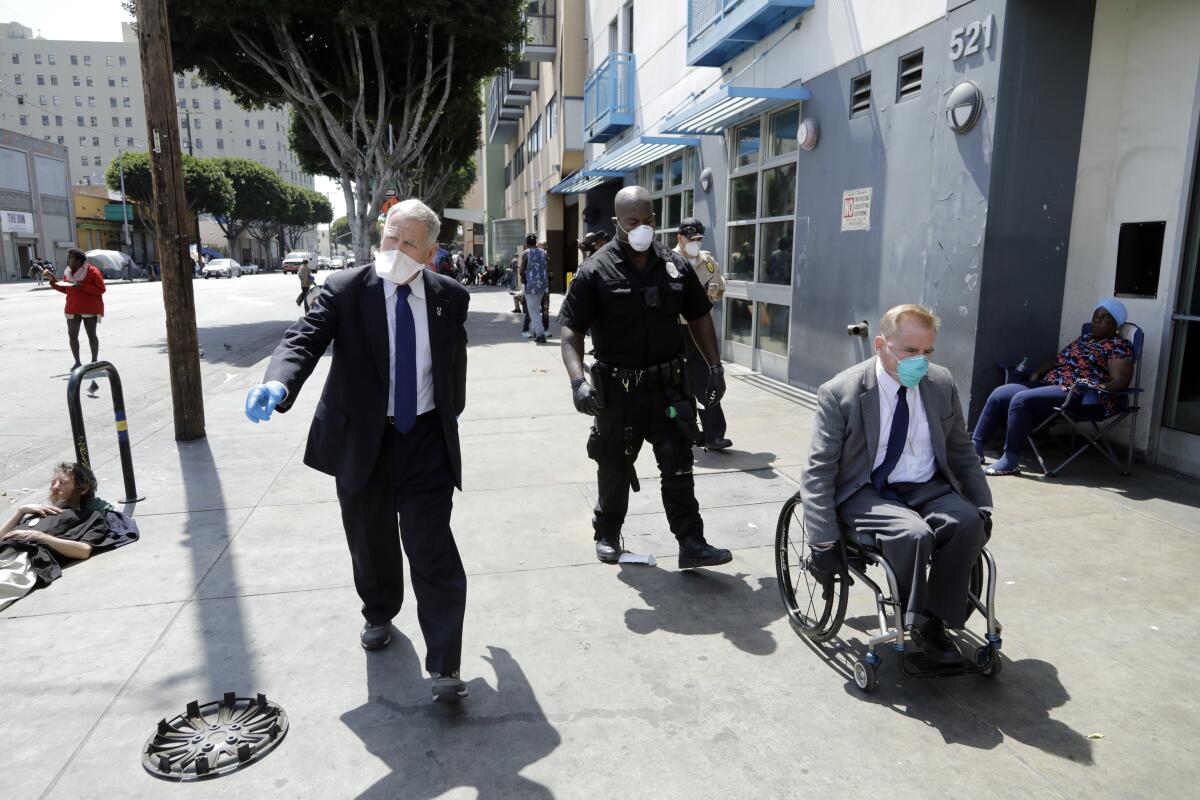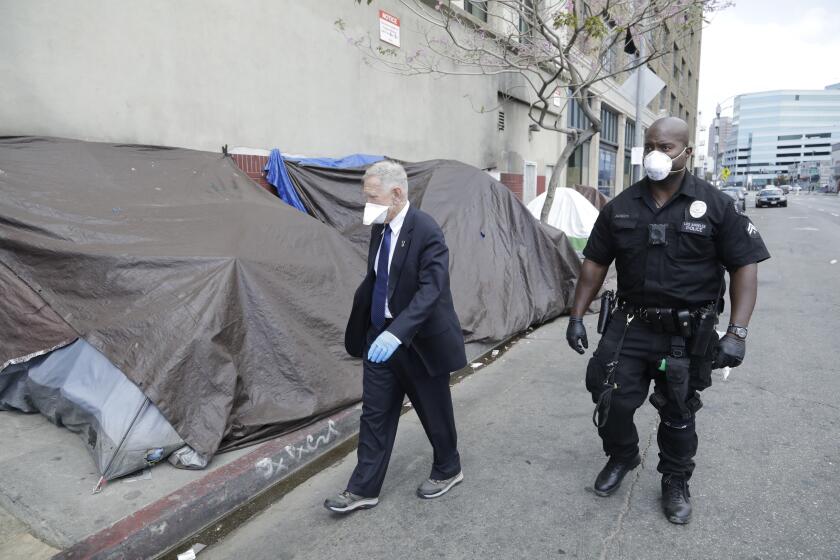Looking to escape ‘endless’ litigation, L.A. is open to federal oversight for homelessness

- Share via
The Los Angeles City Council has authorized City Atty. Mike Feuer to begin discussions about requirements for sheltering the city’s homeless population — a move that could once again place the city under federal oversight.
In a hearing before U.S. District Judge David O. Carter this week, Councilman Joe Buscaino said his colleagues are interested in a settlement agreement with the homeless advocates and downtown stakeholders that would require the city to provide a specific number of shelter beds for each of the council’s 15 districts.
Any such agreement would probably be monitored by a federal judge under a consent decree. If the city meets the requirements, Buscaino said, it could establish a way for the city to be able to enforce anti-camping rules and other laws that federal rulings have blocked in recent years.
“What my colleagues agree upon is that we need to stop this endless cycle of litigation,” he said.
Carter has been presiding over a lawsuit filed by the L.A. Alliance for Human Rights, a group of downtown business owners and residents who allege that the city and County of Los Angeles have failed to protect the public and provide adequate shelter for those living on the streets.
The case has taken on added urgency with the COVID-19 pandemic. Already one skid row shelter has experienced a major outbreak.
In an order issued Friday, Carter said he had been told that Buscaino and council President Nury Martinez would be directly involved in the settlement talks with the plaintiffs.
“The court has been advised that a settlement in this matter will best be achieved by a global settlement implemented on a district-by-district basis,” he wrote.
Carter has said he wants to forge a broader, more permanent solution to L.A.’s homelessness crisis, one that could be modeled after a settlement he brokered in Orange County based on a lawsuit over the clearing of homeless encampments. Under that settlement, Orange County and several cities cannot enforce their anti-camping ordinances until they have provided enough shelter beds to take 60% of the local homeless population off the streets.
At 76, Judge David Carter knows he shouldn’t be on skid row exposing himself to the coronavirus. But he wants more for L.A.’s homeless people.
Matthew Umhofer, an attorney for the L.A. Alliance for Human Rights, said he is encouraged by the City Council’s overture.
But attorney Carol Sobel, who represents the Los Angeles Community Action Network and Los Angeles Catholic Worker, both of which have intervened in the lawsuit before Carter, said any agreement to help 60% of the city’s homeless population would not go far enough. She also questioned the idea that the enforcement of anti-camping laws could be meted out differently in different council districts, depending on the number of beds available.
“I don’t think it’s right to look at Los Angeles as 15 different cities within a city, because they’re all subject to the same laws,” she said.
A spokesman for Feuer declined to discuss details, saying only that the city would continue working to resolve the case and address its homelessness crisis.
But Councilman Bob Blumenfield, who represents the west San Fernando Valley, said he and his colleagues are “very intrigued” by the idea of a federal consent decree that acknowledges the needs of individual council districts and tracks efforts to add shelter beds, overnight parking lots for RVs, and low-cost apartments.
“We’re still fighting a losing battle. More people are falling into homelessness than are being housed. That’s not a recipe for success,” Blumenfield said. “So we’ve got to do something different.”
In recent weeks, Carter has said that a strategy that works to address homelessness in one part of L.A. might not work in another. He also has started talking with council members about homelessness in their districts. Two weeks ago, Blumenfield gave the judge a tour of an emergency homeless shelter in Woodland Hills and encampments under the 101 Freeway and along the Los Angeles River.
“You have to treat these [council districts] like separate cities almost,” Carter said Thursday.
The judge has said L.A. County should be included in the talks, too. In court, the county’s attorney was receptive to the idea.
If a settlement does happen and the city’s compliance with it is supervised by federal judges, as Carter has signaled, it would be the latest instance of local government operations coming under oversight.
In 2001, the Los Angeles Police Department was placed under a consent decree in the wake of the Rampart Division scandal, when dozens of police officers were accused of tampering with evidence, perjury and other misconduct. A judge did not fully conclude the federal oversight until 2013.
A year later, the U.S. Department of Justice announced it would seek to oversee L.A. County’s jails, following a surge in suicides that drew attention to the treatment of inmates with mental illness. The county Sheriff’s Department, which runs the jails, ultimately ended up being bound by four different federal settlement agreements under the consent decree.
City Councilman Mike Bonin, who represents several Westside communities, said he supports the current talks about shelter beds and other strategies, but warned that there could be obstacles to tailoring requirements to each council district.
Boundaries for those districts will be redrawn over the next two years and have the potential to change dramatically, he noted. Bonin also argued that other cities in Los Angeles County will need to do their fair share to address the homelessness crisis.
“If we do everything [to address it], then what’s to prevent the other cities from moving homelessness into Los Angeles?” he said.
Times staff writers Emily Alpert Reyes and Doug Smith contributed to this report.
More to Read
Sign up for Essential California
The most important California stories and recommendations in your inbox every morning.
You may occasionally receive promotional content from the Los Angeles Times.









